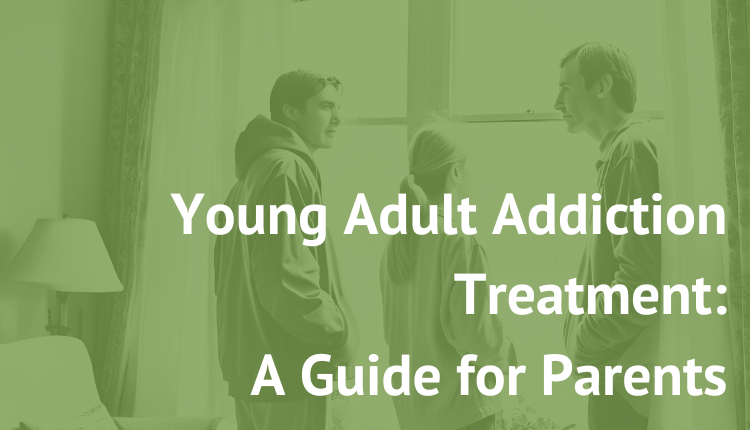A Guide for Parents
There’s an old saying that “a mother is only as happy as her least happy child.” For parents of young adults experiencing substance use disorders, this can be painfully true. The parental urge to help and protect our children is felt deeply, even when our children are grown. Even though parents have the desire to help, it is often unclear what the right course of action would be. Parents of young adults with addiction hear well-meaning advice from many angles, ranging from tough-love hardline strategies to downright enabling practices. Because of the conflicting advice, discerning a good course of action can seem impossible.
Despite the challenges, young adult addiction treatment saves lives, and families can help their loved ones find lifesaving recovery. In this article, New Paradigm Recovery outlines evidence-based strategies for parents of young adults seeking addiction treatment to help start the conversation about treatment and recovery.
Strategies to be an effective ally in your adult child’s recovery:
Convincing a young adult child to seek addiction recovery treatment can be a delicate and challenging process. Here are some suggestions on what to say and how to approach the conversation:
- Express Love and Concern: Start the conversation by expressing your love and concern for your child. Let them know that you care about their well-being and want to support them in getting the help they need.
- Use “I” Statements: Focus on sharing your own feelings and observations rather than placing blame or making accusations. For example, you might say, “I’m worried about you because I’ve noticed changes in your behavior and health.”
- Share Specific Concerns: Be specific about the behaviors or consequences of their addiction that worry you. This could include changes in mood, physical health problems, strained relationships, or difficulties at work or school.
- Offer Support and Resources: Let your child know that they are not alone and that there are resources available to help them overcome their addiction. Offer to help them research treatment options, find support groups, or connect with a therapist or counselor.
- Share Personal Stories: If appropriate, share personal stories or experiences of overcoming challenges or seeking help for yourself or others. This can help your child feel less alone and more hopeful about their own recovery journey.
- Appeal to Their Goals and Values: Remind your child of their goals, aspirations, and values, and how addiction may be hindering their ability to achieve them. Encourage them to consider how seeking treatment can help them get back on track toward their goals.
- Listen Without Judgment: Be prepared to listen to your child’s perspective without judgment or criticism. Validate their feelings and experiences, even if you may not agree with their choices.
- Emphasize the Benefits of Treatment: Highlight the potential benefits of addiction recovery treatment, such as improved physical and mental health, stronger relationships, greater stability, and the opportunity to live a fulfilling life free from the grips of addiction.
- Set Boundaries: Clearly communicate any boundaries or consequences if your child refuses to seek help. This may involve withdrawing financial support, setting limits on certain behaviors, or taking other actions aimed at encouraging them to accept treatment.
- Offer Reassurance and Encouragement: Let your child know that seeking help is a brave and positive step, and that you will be there to support them every step of the way. Encourage them to take things one day at a time and reassure them that recovery is possible with the right support and resources.
In conclusion:
Remember to approach the conversation with empathy, patience, and understanding, and be prepared for resistance or ambivalence from your child. Ultimately, the decision to seek treatment is theirs to make. However, by offering support, guidance, and encouragement, you can help empower them to take the first steps toward recovery.
In conclusion, addressing young adult addiction requires a multifaceted approach that considers their unique needs and challenges. From comprehensive assessments to personalized treatment plans and ongoing support, New Paradigm Recovery emphasizes holistic care to empower young adults on their journey to sobriety. Furthermore, by integrating evidence-based therapies, life skills development, and a supportive community, we strive to equip individuals with the tools they need to embrace a healthier, fulfilling life beyond addiction. With compassion and dedication, we are committed to guiding young adults towards lasting recovery and a brighter future.
Learn more about young adult addiction treatment:
You can read more about addiction treatment resistance in another article by New Paradigm. Additionally, for more general information, find statistics about young adult addiction and substance use disorder treatment at NIH’s National Institute on Drug Abuse. Additionally, you can read more about this topic in the following peer-reviewed articles:
- Hadland, S. E., Yule, A. M., Levy, S. J., Hallett, E., Silverstein, M., & Bagley, S. M. (2021). Evidence-Based Treatment of Young Adults With Substance Use Disorders. Pediatrics, 147(Suppl 2), S204–S214. https://doi.org/10.1542/peds.2020-023523D
- Silverstein, M., Hadland, S. E., Hallett, E., & Botticelli, M. (2021). Principles of Care for Young Adults With Substance Use Disorders. Pediatrics, 147(Suppl 2), S195–S203. https://doi.org/10.1542/peds.2020-023523B

